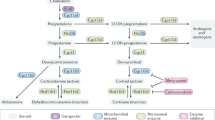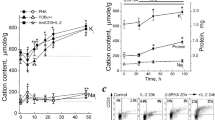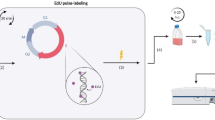Abstract
GLUCOCORTICOIDS exert widespread suppressive effects on lymphocytes of most species1,2. Sensitivity to the hormones is thought to vary with the state of lymphocyte maturation and differentiation. Immature thymic lymphocytes, for example, are more sensitive than mature thymic-dependent lymphocytes1,3. Furthermore, in vitro studies have suggested that glucocorticoid sensitivity varies with the state of mitogen or antigen-induced activation. Nowell4 observed that prednisolone-21-phosphate reduced the number of mitoses induced in human peripheral blood lymphocytes by phytohaemagglutinin (PHA), and noted that this inhibition required the presence of glucocorticoids during the first 24 h of exposure to PHA. When glucocorticoids were added 48 h after PHA, a time when mitoses had not yet appeared, they had no effect on the number of mitoses measured 2 d later. Tormey et al.5 extended these results to show that prednisolone-21-phosphate inhibited incorporation of radiolabelled thymidine and cytidine into PHA-stimulated lymphocytes, and found that delayed addition of steroid resulted in diminished inhibition.
This is a preview of subscription content, access via your institution
Access options
Subscribe to this journal
Receive 51 print issues and online access
$199.00 per year
only $3.90 per issue
Buy this article
- Purchase on Springer Link
- Instant access to full article PDF
Prices may be subject to local taxes which are calculated during checkout
Similar content being viewed by others
References
Claman, H. N. New Engl. J. Med 287, 388–397 (1972).
Munck, A. & Young, D. A. Handbook of Physiology-Endocrinology VI, 231 (1975).
Duval, D., Dausse, J. P. & Dardenne, M. Biochim. biophys. Acta 451, 82–91 (1975).
Nowell, P. C. Cancer Res. 21, 1518–1521 (1961).
Tormey, D. C., Fudenberg, H. H. & Kamin, R. M. Nature 213, 218–219 (1967).
Baxter J. D. & Harris, A. W. Transplantation Proc. 7, 55–65 (1975).
Munck, A. & Wira, C. Meth. Enzy. 36, 255–264 (1975)
Cidlowski, J. A. & Michaels, G. A. Nature 266, 643–645 (1977).
Lippman, M. E., Halterman, R. H., Leventhal, B. G., Perry, S. & Thompson, E. B. J Clin. Invest. 52, 1715–1725 (1973).
Boyum, A. Scand. J. Clin. Lab. Invest. 21, 51–76 (1968).
Scatchard, G. Ann. N. Y. Acad Sci 51, 660–673 (1949).
Lowry, O., Rosenbrough, N. J., Farr, A. & Randall, R. J. J. biol. Chem. 193, 265–275 (1951).
Peck, A. B. & Bach, F. H. J. immun. Meth. 3, 147–164 (1973).
Author information
Authors and Affiliations
Rights and permissions
About this article
Cite this article
SMITH, K., CRABTREE, G., KENNEDY, S. et al. Glucocorticoid receptors and glucocorticoid sensitivity of mitogen stimulated and unstimulated human lymphocytes. Nature 267, 523–526 (1977). https://doi.org/10.1038/267523a0
Received:
Accepted:
Issue Date:
DOI: https://doi.org/10.1038/267523a0
This article is cited by
-
The glucocorticoid receptor 1A3 promoter correlates with high sensitivity to glucocorticoid‐induced apoptosis in human lymphocytes
Immunology & Cell Biology (2014)
-
Effects of mitogenic agents upon glucocorticoid action in human tonsillar T-lymphocytes
Bioscience Reports (1990)
-
‘Pulsed’ immunosuppressive therapy in the treatment of immunologically induced corneal and scleral disease
Eye (1987)
Comments
By submitting a comment you agree to abide by our Terms and Community Guidelines. If you find something abusive or that does not comply with our terms or guidelines please flag it as inappropriate.



